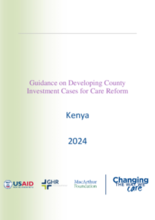The purpose of investment cases is to demonstrate how financial allocations will advance specific public policy objectives, such as promoting healthy childhoods and enhancing human capital. In the context of care reform, investment cases aim to outline the resources needed to transition the child care system towards family-based approaches, prevent child-family separation, and reintegrate children from institutional care into familial settings. These cases involve identifying current investments in care, determining additional funding needs, assessing long-term economic impacts, and generating evidence to justify increased resource allocation. In Kenya, this guidance provides a step-by-step approach to crafting county-level investment cases for care reform, including conducting situational analyses, budget assessments, service cost estimations, and economic analyses to inform decision-making and funding strategies.
The resulting investment cases encompass a snapshot of the county's child vulnerability situation, a breakdown of budgets and expenditures, a calculation of service costs and funding gaps, and an evaluation of the long-term economic implications of investments made. Supported by a detailed costing tool, this guidance facilitates the development of comprehensive investment cases tailored to local contexts, enabling policymakers to make informed decisions and prioritize resource allocation towards care reform initiatives in Kenya.

